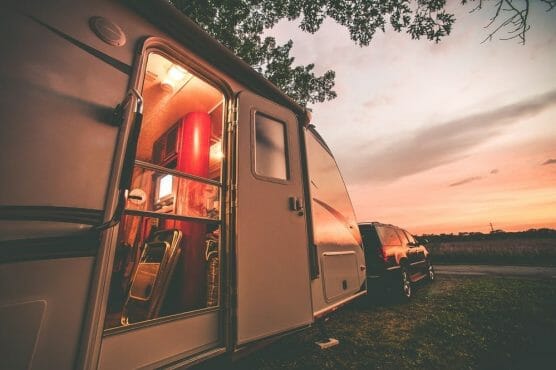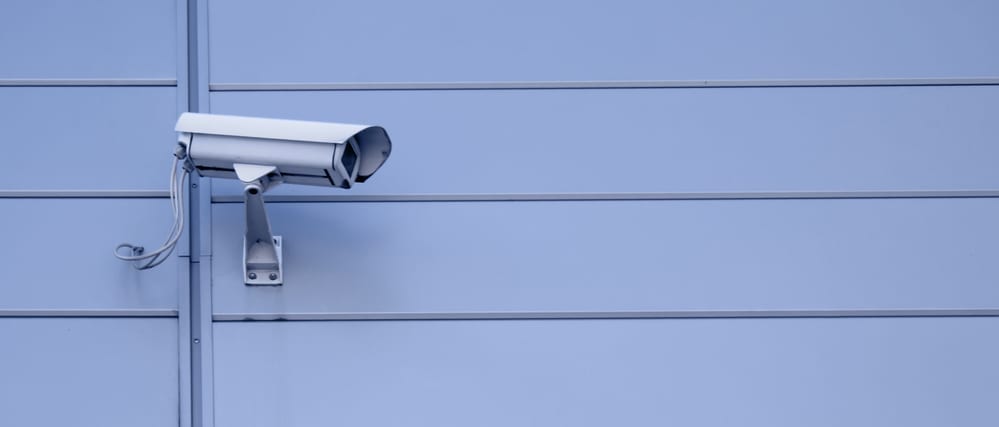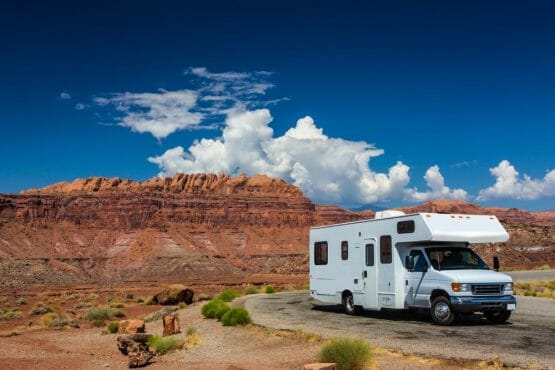Quick Navigation
If you have a mobile home and security is a concern, I recommend the installation of home security cameras. Security cameras allow you to monitor activity in and around your home, watch for visitors or potential intruders, call the authorities in the event of a break-in, and, ultimately, protect your most valuable investment.
What You Will Need to Follow This Tutorial

Security camera installation varies a lot from one product to another. Some products are wired, and others are wireless. Some products have batteries, but others do not. Deciding what to buy is a big part of the installation process. Before you can get started, know your goals for your camera.
Why are you performing the installation? Do you want to monitor your front door, or are you concerned with security all-around your home? Do you want to know what’s going on in the yard and at the edges of your property? Some people install security cameras just to watch what’s going on outside, whereas others install security cameras for the outside and inside.
Step 1: Decide Where to Install Your Cameras
Different cameras can be used in different settings. Some cameras are only intended for indoor use, whereas others can be used both indoors and outdoors. If you have plans to use your camera indoors only, you’re better off buying an indoor-use camera because they tend to be less expensive. As a bonus, indoor cameras are also smaller and easier to hide.
If you plan to install cameras outside, get an all-weather camera. Read the manufacturer specifications before choosing an outdoor camera. Not all cameras can withstand the same temperatures, as reviews.org points out. Know what kind of weather to expect in your area, and buy accordingly. This is especially important if you live in an area that experiences extreme temperatures in the winter or summer.
Step 2: Decide What Kind of Camera to Buy
Deciding what kind of camera to buy is a multi-step process. It starts with you asking yourself a series of questions, as US Mobile Home Pros points out.
Do You Want to Scare People Away?
If your goal is to scare people away as much as it is to monitor your property, buy a camera that’s easy to spot. People are less likely to approach your property if they think that you’re watching them remotely. Intruders are likely to choose an easier target if one is available.
Do You Need to See at Night?
If you live in a wooded area with many animals, it may be that one of your goals is to see in the dark. It’s fun to catch a view of large nighttime animals! If this is the case, infrared cameras are your best bet. Some non-infrared cameras claim to capture images in low light, but you’ll get the best quality and detail with an infrared.
What Happens if the Power Goes Out?
If you live in an area where the power is likely to fail, then backup batteries will be important. Backup batteries enable the camera to keep functioning and recording even in a power outage. I recommend buying the best battery powered security camera you can, for safety.
Do You Want Control Over the Camera’s View?
If you’ve got a large property and would like the ability to see in different directions, you’ll get the most for your money if you buy a camera that can swivel in place. Typically, these cameras are controlled with an app on your phone that tells the camera where to look, when and where to zoom in, and so on.
Would You Like Your Camera to Detect Motion?
Many modern cameras come with a motion detection option that prompts them to turn on when something moving wanders into the camera’s field of vision. Most of the time these cameras are controlled by an app that connects to your smartphone, so you can see what the camera sees as soon as something starts moving on your property.
Do You Want to Hide the Camera?
If you’re hoping to watch something covertly, then a hidden camera is more appropriate. Hidden cameras are effective for surveillance but aren’t always the best at capturing video. Hidden cameras may produce grainy-quality images. This is the price you pay for using a camera that’s so small that no one can see it.
Do You Want Wireless or Wired?
One of the other decisions you have to make when trying to choose a security camera is whether the cameras should be wired or wireless. I personally prefer wireless because I don’t want to worry about the wires during installation, and I certainly don’t want to see more wires running around my home. If you don’t have Wi-Fi or don’t mind the wires, then wired options may be better for you.
Does Image Clarity Matter?
Pixels make all the difference in the world. If clarity of image is important to you (as it is to most people), then you’ll be looking for the best 4k security camera possible. 4k refers to the number of horizontal pixels (4,000). These security cameras are basically high-definition and will leave nothing to question when you’re viewing an image.
Before you can choose a type of security camera for your home, ask yourself these questions. Know your priorities. Decide what really matters in your home security installation. Having the answers to these questions will make it easier going forward.

Step 3: Form a Scope, Plan, and Budget
Budgeting is a part of the process of purchasing a camera system. Most systems charge per camera, so before you can decide which cameras will fit in your budget, decide how many cameras you’ll need for your home. Make a drawing of your property, including a drawing of your house, and decide camera placement based on your goals.
For example, if your goal is to track visitors to your house, you may decide to install a swiveling security camera on your garage, a stationary camera at your front door, and a swiveling camera by your back door. That’s three exterior-grade security cameras. Decide what your budget is, research the cameras you want, then decide if you have enough money to purchase the cameras that meet your needs. Once you have a price point in mind, shopping becomes easier.
Step 4: Install Your Cameras

Once you’ve selected a camera that works for you and you know where to install the camera, installation is usually fairly easy. Follow the manufacturer’s instructions that come with the unit. A good system will walk you through the process. Most modern security systems are almost plug-and-play, meaning you can have one up and running within about 30 minutes or less. This is especially true of interior cameras, which can usually be hidden on a shelf without any mounting or attaching the camera to the wall.
Exterior grade cameras often require mounting, which may require you to drill through your walls. Check out this video for an example: https://www.youtube.com/watch?v=kjypG0ww-4Y.
No matter where you install the video camera, plan to spend some time connecting the camera to the power source. You may have to staple wires to your wall, ceiling, or floors. Even battery powered security cameras usually involve the use of a power source. Batteries generally serve as a backup.
During the installation process, plan to:
- Install the software on your computer and download an app onto your phone.
- Input your home’s Wi-Fi password into the app, assuming you’ve purchased a wireless device.
- Spend a lot of time choosing the exact position that’s right for each camera.
When choosing a location for your exterior cameras, keep them mounted up high where no one can reach them.
Good Luck!
Did you enjoy this tutorial? Has it been useful to you? Leave your comments in the box below. I always strive to post the best information possible. Installing a home security system in your mobile home can keep your property and your family safe. For best results, choose your cameras wisely. Picking the right cameras for you can help you monitor your property and keep it safe from intruders.

